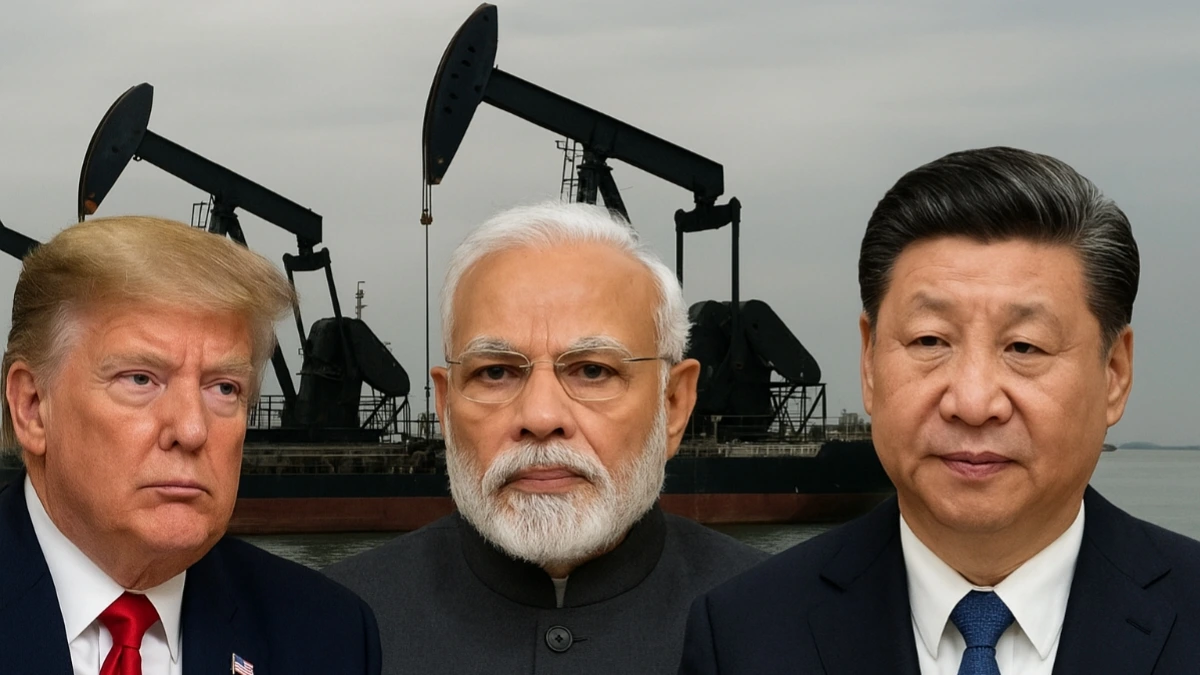WASHINGTON — Western powers are tightening diplomatic and economic pressure on India and China to scale back purchases of Russian oil, as the United States and the United Kingdom move to further isolate Moscow over its war in Ukraine.
US President Donald Trump said Wednesday that India had agreed to stop buying Russian crude, a claim New Delhi has not confirmed, while Britain announced new sanctions targeting major Russian energy firms.
Ukrainian President Volodymyr Zelenskiy is expected to meet Trump in Washington on Friday to discuss further military and energy support. The talks come at a time when Kyiv faces renewed attacks on energy infrastructure and rising tensions across Eastern Europe.
Since Russia’s invasion of Ukraine in February 2022, Moscow has relied heavily on energy exports to sustain its economy. Western sanctions have curtailed its oil sales to Europe, pushing the Kremlin to offer discounted crude to Asian buyers primarily India and China.
India, the world’s third largest oil consumer, quickly became one of Russia’s key lifelines, importing roughly 1.75 million barrels of oil per day. Trade data show Russian oil now accounts for 36% of India’s total crude imports.
However, Washington has made clear that reducing dependence on Russian oil remains a top priority. Trump told reporters Wednesday that Indian Prime Minister Narendra Modi had assured him New Delhi would cease buying Russian oil a statement India later neither confirmed nor denied.
“I was not happy that India was buying oil, and he assured me today that they will not be buying oil from Russia,” Trump said. “That’s a big step. Now we’re going to get China to do the same thing.”
The Indian foreign ministry on Thursday said it was “not aware of any such telephone conversation” between Modi and Trump. Officials added that India’s energy cooperation with the US was expanding, but decisions on oil imports were guided by national interest and market stability.
Energy analysts say Washington’s renewed pressure reflects growing frustration with the resilience of Russia’s oil trade despite Western sanctions.
“India and China have become crucial buyers keeping Russia’s oil revenue afloat,” said Dr. Lina Chen, an energy policy researcher at the London School of Economics.
“Even a moderate reduction from these markets could have a significant impact on Moscow’s war budget.” However, some experts caution that a sudden shift away from Russian crude could create volatility in global oil markets.
“India’s refineries are calibrated for specific grades of Russian oil, and switching suppliers is not an overnight process,” said Rajiv Ghosh, senior analyst at Energy Vista, a Singapore based consultancy. “If India cuts Russian imports too quickly, it could drive up prices and disrupt domestic supply chains.”
British officials announced Thursday that London would impose fresh sanctions on several Russian oil trading firms and shipping operators accused of evading the G7 price cap.
The UK foreign office said the measures aimed to “close loopholes” and “ensure accountability for those funding Russia’s war machine.”
According to data from the International Energy Agency, Russia exported about 7.3 million barrels of oil per day in September, with roughly 70% of that bound for Asia.
India and China together now buy nearly two thirds of Russia’s total crude exports a dramatic shift from pre war trade patterns, when Europe accounted for most of Moscow’s oil sales.
Trade flows show that while India’s Russian oil imports have surged over the past two years, they may decline slightly in coming months. Three Indian refinery sources told Reuters style reporters that a “drop in purchases is possible from December,” though no official directive has been issued.
Meanwhile, oil prices remained steady Thursday, with Brent crude hovering around $86 a barrel. Traders said markets would likely take time to react to India’s possible policy shift.
Reactions within India have been mixed. Some officials emphasize the country’s right to pursue affordable energy amid rising global inflation.
“India will always act in its national interest,” said an Indian petroleum ministry official, speaking on condition of anonymity. “Our energy security cannot be compromised, especially when global prices remain volatile.”
Others, however, see diplomatic opportunities in aligning more closely with Washington.
“India’s strategic partnership with the US is deepening across defense, technology, and trade,” said Meera Deshpande, a New Delhi-based political analyst. “Reducing Russian oil could help unlock progress on broader trade negotiations stalled by tariff disputes.”
In China, state run media dismissed Washington’s pressure campaign as “political interference,” with analysts warning that energy decisions are “a matter of sovereignty.”
Diplomatic sources in Washington said the US is expected to raise the issue of Russian oil imports during upcoming trade talks with Indian officials this week.
The discussions coincide with Washington’s decision to double tariffs on certain Indian goods, signaling a tougher stance on economic negotiations.
Experts believe the next few months will determine whether India gradually rebalances its energy portfolio or resists US demands to maintain cheap Russian oil supplies.
“If India makes even a partial cut, it could mark a significant turning point in Russia’s energy calculus,” said Dr. Chen. “But getting China on board will be far more challenging.”
For Moscow, any reduction in Asian demand could intensify fiscal pressure as it ramps up defense spending amid escalating drone attacks on oil refineries and storage depots.
As the conflict in Ukraine enters its third year, global energy politics continue to evolve under the shadow of war. The US and UK are intensifying efforts to curtail Russia’s oil revenue, while India and China balance economic needs against mounting geopolitical pressure.
Whether Washington’s renewed push will meaningfully alter the flow of Russian oil remains uncertain but the outcome could reshape global energy markets and test alliances across continents.
